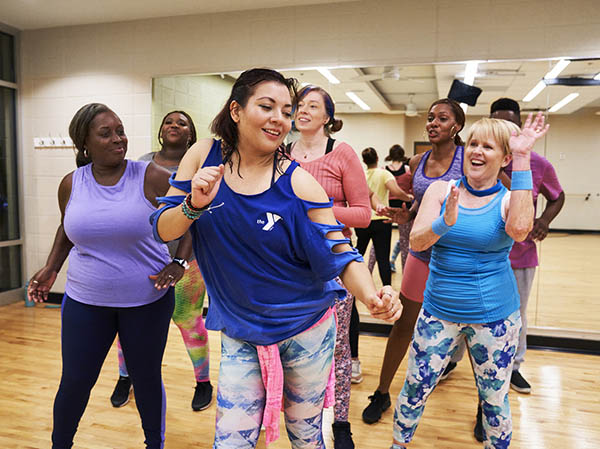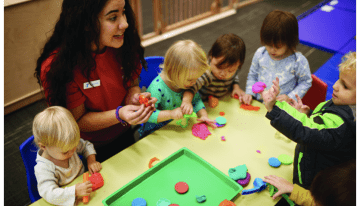Intro
 January is a busy month for YMCAs as new and returning members vow to make good on their personal commitments to improve their health. While physical health is often at the top of our resolution lists, fewer of us make commitments to support our mental health in the same way.
January is a busy month for YMCAs as new and returning members vow to make good on their personal commitments to improve their health. While physical health is often at the top of our resolution lists, fewer of us make commitments to support our mental health in the same way.
At the Y, we understand that we all have mental health — it is how each of us thinks, feels and acts. When we care for our mental health, we develop the ability to feel, express and respond to our emotions effectively. In turn, we become more resilient. We better adapt, cope and thrive in the face of adversity. And we reduce our risk of mental illness. When we care for ourselves, we also increase our ability to care for others.
This year, as many are still recovering from the mental toll of the past few years, caring for our mental health seems especially important. We can be intentional about supporting our mental health through practicing self-care. Moving our bodies, connecting with others, gaining a sense of belonging and asking for help when we need it are all acts of self-care that support positive mental health and reduce the risk of mental struggles. They also are all behaviors that the Y has long supported.
When we care for ourselves, we also increase our ability to care for others.
The Y’s Role
The Y’s Role
During the pandemic, YMCAs across the country recognized that individuals and families were experiencing more mental stressors like increased social isolation and lack of access to basic needs such as food, housing and even formal health care. In response, the Y invested more time and effort in the mental health community care model — a preventive model that recognizes all individuals and organizations are capable of providing informal mental health support that encourages healthy behaviors and resilience. We do this by bringing empathy, compassion and kindness to our work; by building strong relationships and fostering community connections; and by acknowledging how lived experiences affect mental health.
This isn’t something you’ll see listed in your YMCA's program guide necessarily, but it’s something you’ll hear when you’re welcomed at the Y’s front desk, see in the smile of a staff member who stops and listens with genuine care, or feel in a handshake or high-five. It’s an informal but intentional approach to supporting the mental health of our members, neighbors, and communities. It also includes the ability to recognize signs that someone may be struggling and connect them to formal clinical settings when needed.
A Topic in Need of Attention
Mental health support might seem trendy and ubiquitous right now — but that’s because we so desperately need to focus on the contributing factors of increased mental illness in our country today. According to Mental Health America — the nation’s leading community-based nonprofit dedicated to promoting mental health — more than 5.4 million people took a mental health screen in 2021, up 500 percent from 2020. Currently, one in five U.S. adults struggles with mental illness, ranging from anxiety to depression to Post Traumatic Stress Disorder (PTSD). These struggles can be compounded by systemic factors like poverty, racism and discrimination. And our young people are struggling, too. According to the CDC, more than a third of high school students reported experiencing poor mental health during the pandemic, and 44 percent said they persistently felt sad or hopeless.
A Focus for the New Year
 The Y has always been an organization that prioritizes healthy living in spirit, mind and body by promoting healthy behaviors and mitigating risk factors. As we always have, the Y will continue to respond to the current needs of our communities. We will offer spaces and programs that create a sense of belonging, nurture passions and strive to ensure everyone feels supported, welcomed and valued. The Y will intentionally support mental health as part of overall health and well-being so that individuals can better reach their potential, and we as a country can continue to heal and recover from the effects of the pandemic.
The Y has always been an organization that prioritizes healthy living in spirit, mind and body by promoting healthy behaviors and mitigating risk factors. As we always have, the Y will continue to respond to the current needs of our communities. We will offer spaces and programs that create a sense of belonging, nurture passions and strive to ensure everyone feels supported, welcomed and valued. The Y will intentionally support mental health as part of overall health and well-being so that individuals can better reach their potential, and we as a country can continue to heal and recover from the effects of the pandemic.
If you are considering personal goals for the upcoming year, remember that mental and physical health are both fundamental parts of our overall health. If you are unsure where to start or could use help to stay motivated, consider stopping into your local YMCA. The Y is here to offer support and resources to help you improve and maintain your mental and physical health in 2023.





